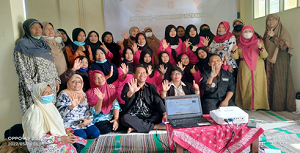Pemberdayaan Bank Sampah Gemi Nastiti untuk Meningkatkan Kesejahteraan dan Kualitas Lingkungan di Desa Makamhaji Kecamatan Kartosuro Kabupaten Sukoharjo Empowerment of Gemi Nastiti Waste Bank to Improve Welfare and Environmental Quality in Makamhaji Village, Kartosuro District, Sukoharjo Regency
Main Article Content
Abstract
In Sukoharjo Regency, more than 140 tons/day of waste goes to the TPA. One of the efforts to solve the waste problem is by establishing a waste bank, one of which is the "Gemi Nastiti" waste bank located in RT 01 RW XI Gobayan, Makamhaji, Kartosuro. As a waste bank that was just formed on September 26, 2021, the problems faced by the waste bank "Gemi Nastiti" in achieving its goals include management problems, inadequate infrastructure, and the skills of the management and members in utilizing waste into goods of economic value. In order to help solve these problems, this service activity is carried out to empower the "Gemi Nastiti" waste bank through waste bank management training, introduction of infrastructure facilities, and training on the use of waste into goods of economic value. The service activities that have been carried out have made the management and members of the Gemi Nastiti waste bank have knowledge and skills related to waste bank management and making handicrafts from plastic waste. In addition, the Gemi Nastiti waste bank has infrastructure to improve the performance of the waste bank in the form of digital scales, closed plastic buckets for each member and handicraft making equipment from plastic waste. In the end, this activity is able to empower the Gemi Nastiti waste bank so that it can improve the welfare and quality of the environment.
Downloads
Article Details

This work is licensed under a Creative Commons Attribution-ShareAlike 4.0 International License.
Authors who publish with this journal agree to the following terms:
- Any article on the copyright is retained by the author(s).
- Author grant the journal, right of first publication with the work simultaneously licensed under a Creative Commons Attribution License that allows others to share work with acknowledgment of the work authors and initial publications in this journal.
- Authors are able to enter into a separate, additional contractual arrangements for non-exclusive distribution of published articles of work (eg, post-institutional repository) or publish it in a book, with acknowledgment of its initial publication in this journal.
- Authors are permitted and encouraged to post their work online (e.g., in institutional repositories or on their websites) prior to and during the submission process, as can lead to productive exchanges, as well as earlier and greater citation of published work.
- The article and any associated published material is distributed under the Creative Commons Attribution-ShareAlike 4.0 International License
References
Hadiningrat, G. (2020). Women's Role in Food Waste Management in Indonesia. In Proceedings of the 1st International Scientific Meeting on Public Health and Sports (ISMOPHS 2019). Paris: Atlantis Press. https://doi.org/10.2991/ahsr.k.201203.006
Istanabi, T., Miladan, N., Suminar, L., Kusumastuti, K., Aliyah, I., Soedwiwahjono, S., et al. (2022). Pengelolaan Bank Sampah sebagai implementasi Ekonomi Kreatif di Bank Sampah Guyub Rukun Dusun Madugondo, Kecamatan Piyungan, Bantul. PengabdianMu: Jurnal Ilmiah Pengabdian Kepada Masyarakat, 7(3), 407–413. https://doi.org/10.33084/pengabdianmu.v7i3.2765
Kahfi, A. 2017. Tinjauan Terhadap Pengelolaan Sampah. Jurisprudentie : Jurusan Ilmu Hukum Fakultas Syariah dan Hukum, 4(1), 12-25. https://doi.org/10.24252/jurisprudentie.v4i1.3661
Muriany, B. J., Alimu, F., Titarsole, C., Palembang, S. R., Musa’ad, S., Sihabbudin, N., et al. (2021). Sosialisasi Bank Sampah di Kelurahan Pandan Kasturi. PATTIMURA MENGABDI (Jurnal Pengabdian Kepada Masyarakat), 1(1), 120-124
Nasution, S. R., Rahmalina, D., Sulaksono, B., & Doaly, C. O. (2018). IbM: Pemanfaatan Limbah Plastik Sebagai Kerajinan Tangan Di Kelurahan Srengseng Sawah Jagakarsa Jakarta Selatan. Jurnal Ilmiah Teknik Industri (Jurnal Keilmuan Teknik dan Manajemen Industri), 6(2), 117-123. https://doi.org/10.24912/jitiuntar.v6i2.4119
Purwanti, I. (2021). Konsep Dan Implementasi Ekonomi Sirkular Dalam Program Bank Sampah Studi Kasus: Keberlanjutan Bank Sampah Tanjung. AmaNU: Jurnal Manajemen dan Ekonomi, 4(1), 89-98.
Ratnani, R. D. (2008). Teknik Pengendalian Pencemaran Udara yang Diakibatkan oleh Partikel. Majalah Ilmiah MOMENTUM, 4(2), 27-32. http://dx.doi.org/10.36499/jim.v4i2.612
Rhohman, F. & Nuryosuwito. (2021). Analisa Matematis Hasil Biogas Dari Sampah Sayuran Berdasarkan Perbedaan Jumlah Bahan. Jurnal Mesin Nusantara, 4(2), 84-89. https://doi.org/10.29407/jmn.v4i2.17092
Saputro, Y. E., Kismartini, & Syafrudin. (2015). Pengelolaan Sampah Berbasis Masyarakat Melalui Bank Sampah. Indonesian Journal of Conservation, 4(1), 83-94. https://doi.org/10.15294/ijc.v4i1.5162
Suryani, A. S. (2014). Peran Bank Sampah Dalam Efektivitas Pengelolaan Sampah (Studi Kasus Bank Sampah Malang). Aspirasi: Jurnal Masalah-Masalah Sosial, 5(1), 71-84. https://doi.org/10.46807/aspirasi.v5i1.447
United Nations. (2017). The Sustainable Development Goals Report 2017. https://unstats.un.org/sdgs/report/2017/
Wardani, I. A. K., Pangestu, B. A., Putri, R., Mandagi, A. M., & Puspikawati, S. I. (2020). Implementasi Bank Sampah Jelun (BSJ) sebagai Alternatif Solusi Permasalahan Sampah Desa Jelun Banyuwangi. E-Dimas (Educations-Pengabdian kepada Masyarakat), 11(3), 343-350. https://doi.org/10.26877/e-dimas.v11i3.5833
Wardani, I. S. (2021). Ih... Jorok! Sampah Dibuang Sembarangan Di Sukoharjo Capai 25 Ton Per Hari. https://www.solopos.com/ih-jorok-sampah-dibuang-sembarangan-di-sukoharjo-capai-25-ton-per-hari-1108612
Widiyanto, A. F. & Rahab. (2017). Community Participation in Bank of Garbage: Explorative Case Study in Banyumas Regency. Masyarakat, Kebudayaan dan Politik, 30(4), 367-376. https://doi.org/10.20473/mkp.V30I42017.367-376
